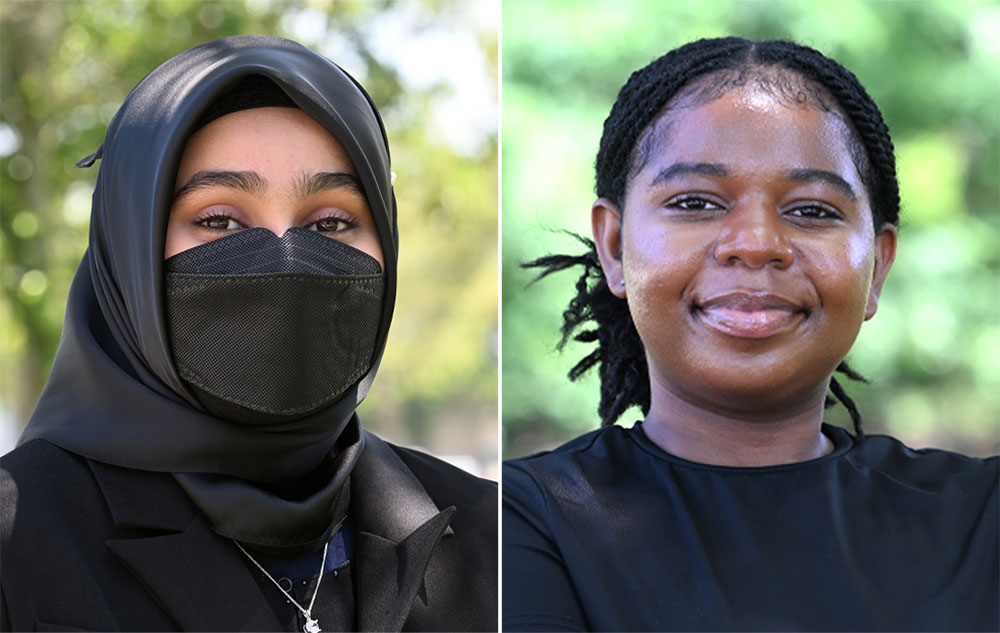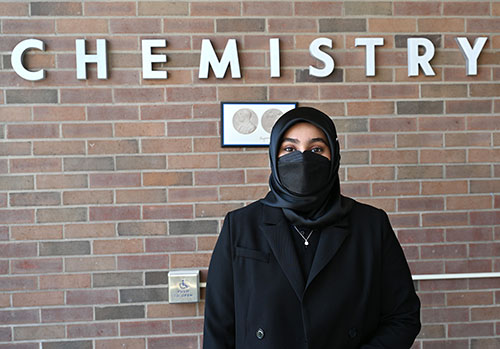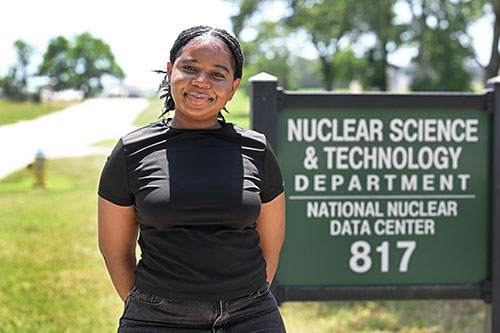Two Community College Interns Earn Scholarships to Pursue Bachelor's Degrees
The awardees have interned with Brookhaven Lab since 2024
July 9, 2025
 enlarge
enlarge
Interns, Ieesha Ansar (left) and Pedrocia De-Sosoo (right), were awarded a scholarship for internship research at Brookhaven National Lab. (Kevin Coughlin/Brookhaven National Laboratory)
Ieesha Ansar and Pedrocia De-Sosoo, two students conducting research as interns at the U.S. Department of Energy’s (DOE) Brookhaven National Laboratory, have earned a prestigious scholarship in part for their contributions through the DOE Office of Science’s Community College Internships (CCI) program. The Jack Kent Cooke Transfer Scholarship can provide tuition coverage of up to $55,000 per academic year for each awardee to advance their education at a four-year university.
The students started at Brookhaven in 2024, after being introduced to the Lab by their mentor, Sharon Lall-Ramnarine, a professor at Queensborough Community College (QCC) and research collaborator at Brookhaven Lab. Last summer, Ansar contributed to research in the Lab’s Chemistry Division, while De-Sosoo undertook a coding project in the Nuclear Science and Technology Department.
“I liked my project so much that I changed from biology to chemistry, so I did my associate degree in chemistry,” said Ansar, who completed her two-year degree this May. De-Sosoo also graduated this year, earning her associate degree in computer science.
Both students, who became friends through their common QCC-to-Brookhaven path, have returned to the Lab this summer.
Synthesizing ionic liquids
 enlarge
enlarge
Ieesha Ansar, a Community College Intern, pictured in the Chemistry Building. (Kevin Coughlin/Brookhaven National Laboratory)
Ansar has been collaborating with James Wishart, a chemist studying ionic liquids. These substances are composed of ions, like table salt, but remain liquid at high temperatures. They can be used as powerful solvents, including in processes used to separate and safely dispose of nuclear waste. While traditional solvents can be flammable or volatile, ionic liquids have greater stability and could be a greener option, Wishart said.
To better understand future applications of ionic liquids, Ansar is currently synthesizing and studying those with hydroxyl groups attached. These groups consist of an extra oxygen and hydrogen atom, which changes the properties of the molecule.
“We’re studying the nanoscale interactions, and we’re interested in learning the physical properties of those specific ionic liquids,” said Ansar.
As Wishart explained, “You can’t just go out and buy the ionic liquids we need in these studies, so we have interns synthesize them.” His team makes hypotheses based on the chemical composition of the liquid they want, and the interns try to make that liquid in-house.
Wishart’s team uses techniques like nuclear magnetic resonance spectroscopy to understand the molecular shape of the resulting ionic liquid. Mapping the shape of the molecule is the first step to understand its properties, for example melting or evaporation points.
Building a website for nuclear fission data
 enlarge
enlarge
Community College Intern, Pedrocia De-Sosoo, is developing virtual models of nuclear physics experiments. (Kevin Coughlin/Brookhaven National Laboratory)
For her second Brookhaven summer, De-Sosoo is continuing her effort to model the output of fission experiments in the Nuclear Science and Technology Department. Fission is a process where the nucleus of an atom is split, releasing energy. This work was part of the Developing the Next Generation Radiation Safety Professional program sponsored by DOE’s National Nuclear Security Administration.
“Last year, I was building a website for the evaluation of fission yields,” based on data that had been collected since the 1940s, De-Sosoo said. Fission yield data is crucial for technicians at nuclear reactors, who need to know the inventory of all possible isotopes present in the core during operation, and in spent nuclear fuel.
“You want to know exactly how much of each product that can affect, for example, reaction operation and spent fuel storage,” said Brookhaven Lab nuclear physicist Andrea Mattera, one of De-Sosoo’s mentors.
While data and statistics have been collected for decades, building a consolidated database is a tall task. De-Sosoo brought her computer science background to this physics project, recording and modeling the data in 2D.
“She started from basically a blank page, going through all the codes that are needed to extract the data, look at the data, correct the data, and she compiled all the codes,” said Mattera.
This summer, De-Sosoo will continue to use her computer science knowledge to generate a virtual model of an experiment performed at the National Synchrotron Light Source II (NSLS-II) to measure fission product yields. NSLS-II is a DOE Office of Science user facility at Brookhaven Lab that produces ultrabright X-rays for studying the physical, chemical, and electronic makeup of materials.
Opportunities open doors
Both students are grateful for the opportunities Brookhaven Lab has given them.
“They give you the chance to use your mind to create something — which is something you don’t really get in a typical college campus,” De-Sosoo said.
Aleida Perez, interim manager of Workforce Development & Science Education at Brookhaven Lab, said, “The CCI program gives students the opportunity to build connections while gaining skills and exposure to impactful and cutting-edge science at DOE’s national laboratories. It also helps build the scientific and technical workforce of the future.”
To earn the Jack Kent Cooke scholarships, Ansar and De-Sosoo had to stand out from among an initial pool of more than 1,600 applicants from 212 community colleges across the country. That group shrank to a smaller — though still sizable — pool of 467 semifinalists in March, before the QCC students were selected as two of the 90 finalists in May.
“We’re certain that their research at Brookhaven was a deciding factor in them receiving this scholarship,” said Lall-Ramnarine, the students’ QCC mentor.
Both students are still deciding where they’ll continue their formal education as they immerse themselves in another summer of research at Brookhaven Lab.
Brookhaven National Laboratory is supported by the Office of Science of the U.S. Department of Energy. The Office of Science is the single largest supporter of basic research in the physical sciences in the United States and is working to address some of the most pressing challenges of our time. For more information, visit science.energy.gov.
Follow @BrookhavenLab on social media. Find us on Instagram, LinkedIn, X, and Facebook.
2025-22518 | INT/EXT | Newsroom









